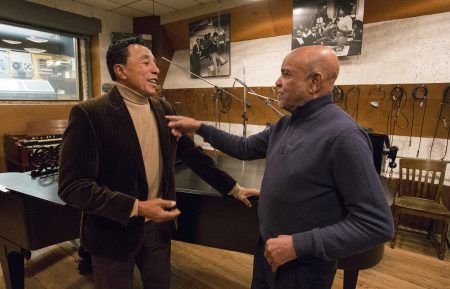Berry Gordy

Executive • Producer
Birth Date: November 28, 1929
Age: 95 years old
Birth Place: Detroit, Michigan
Partners: Diana Ross
The founder and president of one of America's most successful and influential record labels, Berry Gordy, Jr. created Motown Records, which from the 1960s through the late 1980s was one of the most important labels in American popular music. A boxer-turned-songwriter, Gordy realized the importance of ownership when it came to artistic endeavors like music, and in 1959, he launched Motown in suburban Detroit.
With its roster of stellar artists that included such legends as Smokey Robinson, the Jackson 5, Marvin Gaye and Diana Ross and the Supremes, Motown epitomized the ebullience of youth - both black and white - and the hopefulness of the future in song after hit song. Changing times reduced Motown's standing in the music field, but Gordy's vision, determination and leadership helped to make it one of the most enduring and important companies in the history of American music.
Born Berry Gordy, Jr. in Detroit, MI on Nov. 28, 1929, he was the seventh of eight children born to contractor Berry Gordy, Sr., and his wife, Bertha, an insurance salesperson and real estate agent. Boxing was Gordy, Jr.'s first love, leading him to drop out of high school to pursue a career as a featherweight fighter. He fought 15 Golden Gloves matches between 1948 and 1951, winning 12, but his momentum was cut short by the Korean War.
After his discharge in 1953, he returned to Detroit to open a record store, the 3-D Record Mart, which he financed with his service pay. The store catered to Berry's taste for jazz, but local buyers were more interested in the growing trends in rock-n-roll and R&B, so the store folded in 1955.
Married and with three small children to support, Berry worked for his father before joining the automotive assembly line at the local Ford plant. To combat the relentless monotony of the job, he began composing songs in his head. He then submitted the tunes to various contests and local talent, one of which, the explosive soul singer Jackie Wilson, went on to record. "Reet Petite," penned by Gordy, his sister Gwen and Billy Davis, was a sizable hit, netting its authors $100 in royalties.
Over the next few years, Wilson saw several of his songs reach the national charts, including Wilson's signature tune, "Lonely Teardrops." However, he was dismayed by the amount of money he was earning from his work, especially when he saw the size of the returns that Decca, the label that released the record, was gaining. He decided that in order to be a success in the music business, one needed to not only write the songs, but own them as well.
Gordy began producing his own records, and his early choices for acts demonstrated his unerring ability to spot exceptional talent. After seeing a vocal group called the Miracles at a talent show in 1957, he recorded their first single, and cultivated a working relationship with their lead singer, William "Smokey" Robinson, who became his vice president. Gordy also recorded songs by Eddie and Brian Holland, who would become two-thirds of the formidable Holland-Dozier-Holland writing team.
As his Motown team began to fall into place, Gordy also launched his own publishing company, Jobete, which took its name from letters in each of his four children. With $800 of his family's money, he launched a record label, Tamla, which was soon followed by a second, called Motown.
In 1959, Gordy purchased a row house on West Grand Avenue that served as Motown's headquarters as well as a home for his family. By the following year, Motown had landed three Top 5 hits on the pop and R&B charts - Barrett Strong's "Money (That's What I Want"), the Miracles' "Shop Around" and the Marvelettes' "Please Mr. Postman," which was the label's first No. 1 hit.
Records by artists like Mary Wells, Marvin Gaye, a vocal group called the Distants whom Gordy renamed The Temptations, and a trio of teenaged girls who were dubbed the Supremes, helped to place Detroit on the map as a center for popular music, as well as expand Motown's fortunes.
By 1960, Gordy owned nine houses on West Grand Avenue that contained the offices for the Motown Recording Company, which included Motown's numerous record labels, such as Tamla, VIP and Soul; a recording studio called "Hitsville USA;" the offices of Jobete publishing; International Talent Management, Inc; and the Motown Artists' Development Department, which groomed the up-and-coming talent according to Gordy's desire to present them as refined, educated young men and women.
Each was devoted to a single purpose: to present "The Sound of Young America," a blend of pop, R&B and rock-n-roll that preserved its African-American roots in its impassioned vocals while appealing to white audiences with its undeniable rhythms and lyrics about young love and good times.
The addition of acts like the Four Tops, Martha and the Vandellas, the Isley Brothers and teenage genius Stevie Wonder only boosted the sheer number of hits that Motown was churning out each year. By 1971, they could boast some 110 chart-topping songs in their roster.
Many of these became outright classics of pop music, including Gaye's "I Heard It Through the Grapevine," the Supremes' "You Can't Hurry Love," the Temptations' "My Girl," Martha Reeves' "Heat Wave," and on and on.
By the late Sixties, Motown had expanded its empire to include offices in downtown Detroit and Los Angeles, but not everything was golden behind boardroom doors. Many artists privately chafed at the restrictions placed on them by Gordy, including which songs they could record and with which producers; disputes over royalty payments - the same issue that forced Gordy to launch the label - resulted in arguably his most successful writer-producer team, the Holland brothers and Lamont Dozier - to quit the company in 1967.
Two new labels, Hot Wax and Invictus, also failed to generate the same level of excitement as his older imprints.
Despite these setbacks, Gordy was still sitting atop a hit-making empire with Motown. Acts like Wonder, the Temptations, Gaye, and a now solo Diana Ross were recording some of their greatest and most adventurous music in the early 1970s.
As a bonus, a new family group called the Jackson 5 - headlined by a precocious preteen named Michael Jackson - was soon to take its place alongside the other Motown acts as one of its most popular outfits.
In 1972, Gordy moved the label to Los Angeles to branch out into the motion picture and television industry. The relocation caused yet another schism within Motown, with many acts, including Gladys Knight and the Pips, the Four Tops, and the label's crack band of session players, the Funk Brothers, either remaining in Detroit or quitting Motown altogether.
Though the defections pained Gordy, he pressed on with his dreams of an entertainment empire. The Motown Productions label, which had produced several successful TV specials, including "TCB" (NBC, 1968) with the Supremes and the Temptations, launched into full gear with specials for Diana Ross ("Diana!" ABC, 1971) and the Jackson Five ("Going Back to Indiana," ABC, 1971).
Gordy retired as President of Motown Records to become chairman of the Board at Motown Industries, which oversaw its interests in film, television and publishing. Motown Productions' first motion picture was a starring vehicle for Gordy's rumored girlfriend, Diana Ross, called "Lady Sings the Blues" (1972), which told the story of tragic jazz singer Billie Holiday. A success at the box office, it garnered five Oscar nominations, including one for Ross, and placed Motown squarely on the movie business map, to say nothing of boasting a virtually all African-American cast.
A follow-up, "Mahogany" (1975), was a sudsy showbiz drama that reunited Ross with her "Blues" co-star Billy Dee Williams, who went on to star in Motown's next features, "Bingo Long's Traveling All-Stars and Motor Kings" (1976) and the biopic "Scott Joplin" (1977). "Thank God It's Friday" (1978), which melded the growing disco craze with the Motown label, was a low-budget comedy that was a smash with ticket buyers, but their next effort, an expensive feature version of the Broadway musical "The Wiz" (1978), with Ross, Michael Jackson, Nipsey Russell and Richard Pryor, was a costly flop.
From that point onward, Motown Productions placed its focus squarely on television specials about Motown's legacy. Gordy eventually sold the company in 1989 to his longtime right-hand-woman, Suzanne de Passe.
Roster changes were almost constant at Motown during the 1970s and 1980s; the Jackson Five moved to Epic in 1975, while Ross caused Gordy considerable anguish by leaving the label in 1981. Their rumored relationship exceeded the bounds of typical company owner-talent arrangements; the pair had a lengthy romantic involvement, from which a daughter, Rhonda Ross Kendrick, was born while Ross was married to Robert Silberstein.
It would take Ross decades to own up to her romance with Gordy and the paternity of her eldest child, even though for years the resemblance between Gordy and Rhonda was undeniable. If consolation could be found from such blows, Gordy found it in the record sales generated by the label's newest acts, the Commodores and Rick James, as well as with established artists like Stevie Wonder, Marvin Gaye, and the Miracles.
The company continued to hold influence in the recording industry well into the 1980s, especially after the release of Commodores lead singer Lionel Richie's solo album Can't Slow Down (1984), which became the company's biggest hit in its history after selling 10 million copies worldwide, and gave their one-time Motown resident Michael Jackson's Thriller a run for its money on the Billboard charts.
But as the decade drew to a close, Motown's fortunes began to slow. With the majority of its classic acts now defunct, considered passé, on other labels, or, in the tragic case of Gaye, deceased, the Motown Sound was gradually losing its finger on the pulse of Young America.
Efforts to expand the imprint to Latin and rock audiences failed to generate much interest, so in 1988, Gordy sold his interests to MCA and Boston Ventures for $61 million - the same year he was inducted into the Rock and Roll Hall of Fame. He later followed suit with Jobete, which went to EMI Publishing in 1997.
With sister Esther Edwards, he helped to preserve the recording studio known as "Hitsville USA" by turning it into the Motown Museum.
A retired Gordy spent most of the 1990s and new millennium reaping honors for his contributions to American popular culture. The recipient of the Martin Luther King, Jr. Leadership Award in 1969, he added further laurels in 1991 with the National Academy of Recording Arts and Sciences Award and in 2009 with induction into the Songwriters Hall of Fame.
Gordy also chronicled his life and history with Motown in his 1994 autobiography, To Be Loved. He was portrayed in several TV projects related to Motown, including "The Jacksons: An American Dream" (ABC, 1992), where he was played by his former leading man, Billy Dee Williams, and by Obba Babatunde in "The Temptations" (1998).
The character of Curtis Taylor, Jr. from the 1981 musical "Dreamgirls," which was inspired by the lives and careers of the Supremes, was reportedly based on Gordy; the 2006 film version, with Jamie Foxx as Taylor was more explicit in connecting the character to Gordy, who publicly criticized the decision.
The film's producers, DreamWorks and Paramount, later apologized for the slight. The most press coverage Gordy had received in years came sadly with the shocking passing of Michael Jackson on June 25, 2009.
Jackson, who had reportedly worshipped Gordy as a father figure during his childhood spent at Motown, had remained fond of his old boss. The feeling was mutual, as Gordy spoke lovingly of his onetime protégé at the televised M.J. funeral seen round the world in July 2009.
Credits

The 44th Annual Kennedy Center Honors

CBS Mornings

Hitsville: The Making of MotownStream

Smokey Robinson: The Library of Congress Gershwin Prize for Popular Song

Celebrity PageStream

Michael Jackson's Journey from Motown to Off the Wall

Michael Jackson: The Journey

BET Honors 2014

An Evening With Berry Gordy

CBS This Morning

Kiss and Tell: The History of Black Romance in Movie

Tavis Smiley

American IdolStream

The Bingo Long Traveling All-Stars & Motor KingsStream



![Premiere of Showtime?s ?Hitsville: The Making of Motown? at the Harmony Gold in Los Angeles, California on August 8, 2019Featuring: Berry GordyWhere: Los Angeles, California, United StatesWhen: 09 Aug 2019Credit: Sheri Determan/WENN.com (Newscom TagID: wennphotosseven329434.jpg) [Photo via Newscom]](https://media.baselineresearch.com/images/1914941/1914941_small.jpg)
![Premiere of Showtime?s ?Hitsville: The Making of Motown? at the Harmony Gold in Los Angeles, California on August 8, 2019Featuring: Berry GordyWhere: Los Angeles, California, United StatesWhen: 09 Aug 2019Credit: Sheri Determan/WENN.com (Newscom TagID: wennphotosseven329437.jpg) [Photo via Newscom]](https://media.baselineresearch.com/images/1914929/1914929_small.jpg)







